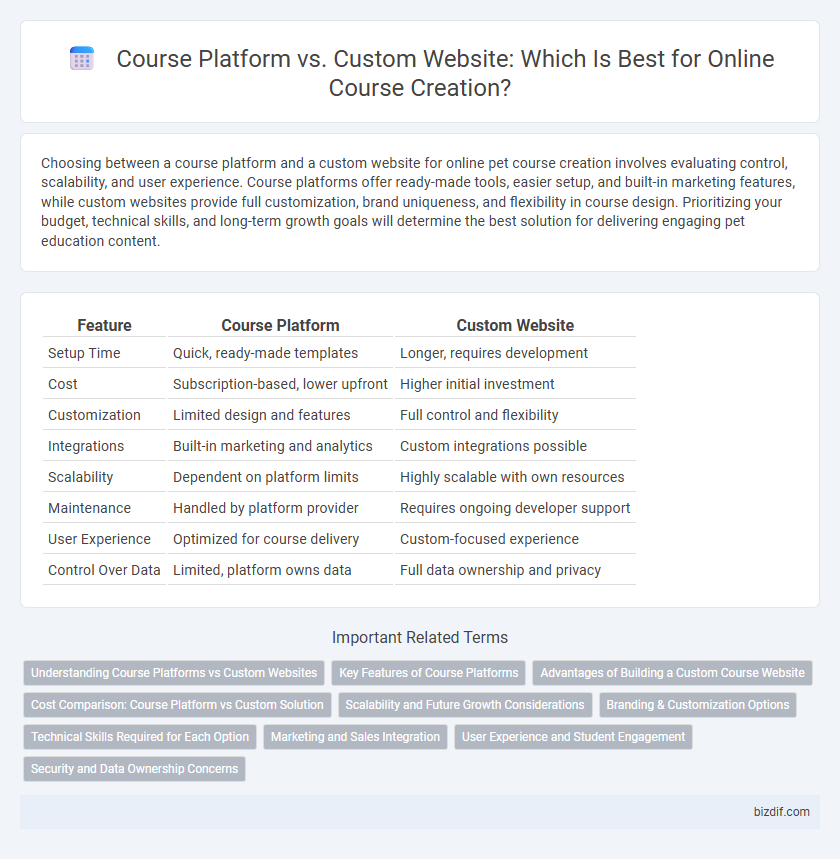Choosing between a course platform and a custom website for online pet course creation involves evaluating control, scalability, and user experience. Course platforms offer ready-made tools, easier setup, and built-in marketing features, while custom websites provide full customization, brand uniqueness, and flexibility in course design. Prioritizing your budget, technical skills, and long-term growth goals will determine the best solution for delivering engaging pet education content.
Table of Comparison
| Feature | Course Platform | Custom Website |
|---|---|---|
| Setup Time | Quick, ready-made templates | Longer, requires development |
| Cost | Subscription-based, lower upfront | Higher initial investment |
| Customization | Limited design and features | Full control and flexibility |
| Integrations | Built-in marketing and analytics | Custom integrations possible |
| Scalability | Dependent on platform limits | Highly scalable with own resources |
| Maintenance | Handled by platform provider | Requires ongoing developer support |
| User Experience | Optimized for course delivery | Custom-focused experience |
| Control Over Data | Limited, platform owns data | Full data ownership and privacy |
Understanding Course Platforms vs Custom Websites
Course platforms offer streamlined tools, built-in marketing, and payment processing, enabling educators to launch courses quickly without extensive technical knowledge. Custom websites provide full control over branding, design, and user experience but require significant investment in development and maintenance. Evaluating goals, budget, and technical skills determines whether a course platform or custom website optimally supports long-term online course success.
Key Features of Course Platforms
Course platforms offer built-in key features such as integrated payment processing, user management, and content hosting, streamlining the course creation process for educators. They provide scalable solutions with analytics dashboards, drip content capabilities, and community forums that enhance learner engagement without requiring extensive technical skills. These platforms also ensure mobile responsiveness and robust security protocols, making them ideal for creators seeking efficient deployment and maintenance.
Advantages of Building a Custom Course Website
Building a custom course website offers unparalleled flexibility in design and functionality tailored specifically to your brand and audience needs. It enables seamless integration of unique features such as personalized learning paths, advanced analytics, and custom payment gateways unavailable on generic course platforms. This control enhances user experience and scalability, fostering long-term growth and differentiation in the competitive online education market.
Cost Comparison: Course Platform vs Custom Solution
Course platforms typically offer lower upfront costs with subscription or revenue-sharing models, making them accessible for beginners and small businesses. Custom websites require higher initial investment for development, maintenance, and hosting but provide greater control and scalability in the long term. Evaluating total cost of ownership, including ongoing fees and customization needs, is essential for choosing between a course platform and a custom solution.
Scalability and Future Growth Considerations
Course platforms offer immediate scalability with built-in infrastructure, user management, and marketing tools, allowing creators to quickly expand their reach. Custom websites provide greater flexibility for future growth, enabling tailored features and seamless integration of advanced technologies as the business evolves. Evaluating long-term goals, technical resources, and desired user experience is essential to determine the best scalable solution for sustainable growth in online course creation.
Branding & Customization Options
Course platforms offer streamlined branding tools and limited customization options designed for quick deployment and user-friendly management. Custom websites provide extensive branding flexibility and tailored design capabilities, allowing complete control over user experience and visual identity. Businesses focused on unique brand expression and advanced customization prioritize custom websites, while those valuing ease of use and standardized features often select course platforms.
Technical Skills Required for Each Option
Course platforms require minimal technical skills, offering user-friendly interfaces and built-in tools designed for easy course creation and management. Custom websites demand advanced technical expertise, including proficiency in web development, coding languages like HTML, CSS, JavaScript, and experience with hosting, security, and maintenance. Choosing between them depends on your technical ability and willingness to handle complex backend tasks versus preferring a streamlined, ready-made solution.
Marketing and Sales Integration
Course platforms offer built-in marketing and sales integration tools such as email automation, sales funnels, and affiliate management, streamlining customer acquisition and revenue tracking. Custom websites provide greater flexibility to implement tailored marketing strategies using third-party tools like CRM systems, advanced analytics, and personalized checkout experiences. Selecting between the two depends on balancing ease of setup with the need for customized marketing capabilities that align with business objectives.
User Experience and Student Engagement
Course platforms offer streamlined user interfaces with built-in engagement tools like quizzes, forums, and progress tracking that enhance student interaction and satisfaction. Custom websites provide greater flexibility to tailor user experience and branding but require significant development to integrate effective engagement features. Prioritizing platform features that support seamless navigation and interactive content significantly boosts student retention and learning outcomes.
Security and Data Ownership Concerns
Choosing between a course platform and a custom website significantly impacts security and data ownership, as platforms often handle security protocols but retain data control, potentially risking privacy. Custom websites allow full ownership and tailored security measures, reducing dependency on third-party vulnerabilities. Ensuring compliance with data protection regulations like GDPR and implementing SSL encryption are critical regardless of the choice to protect student information.
Course platform vs Custom website Infographic

 bizdif.com
bizdif.com